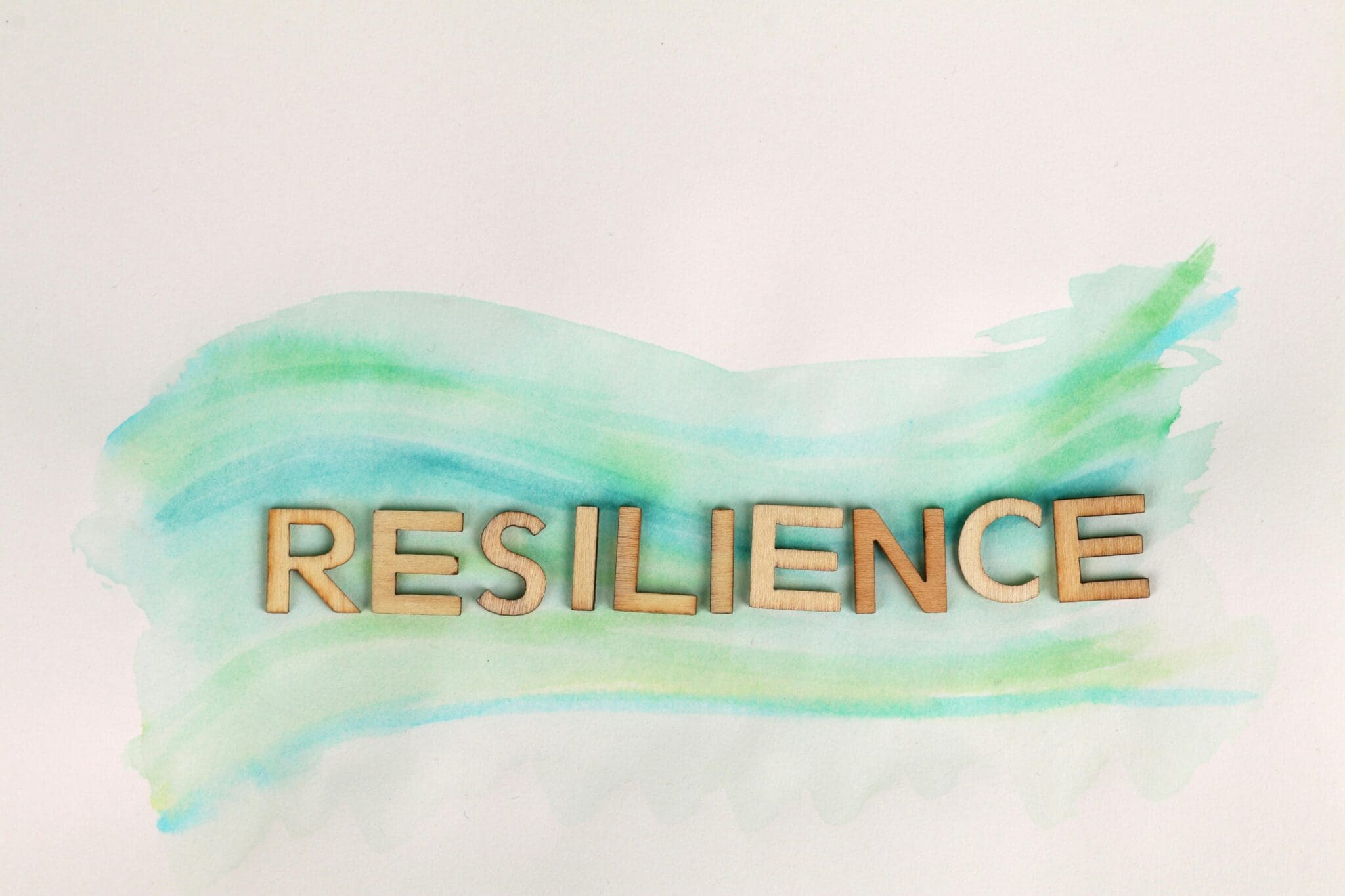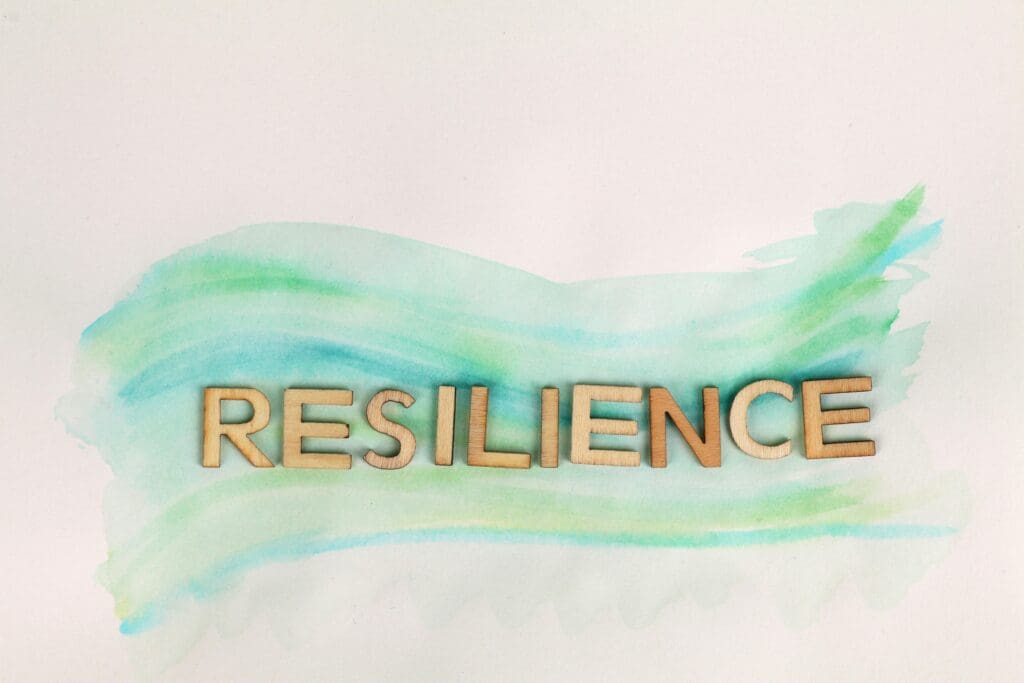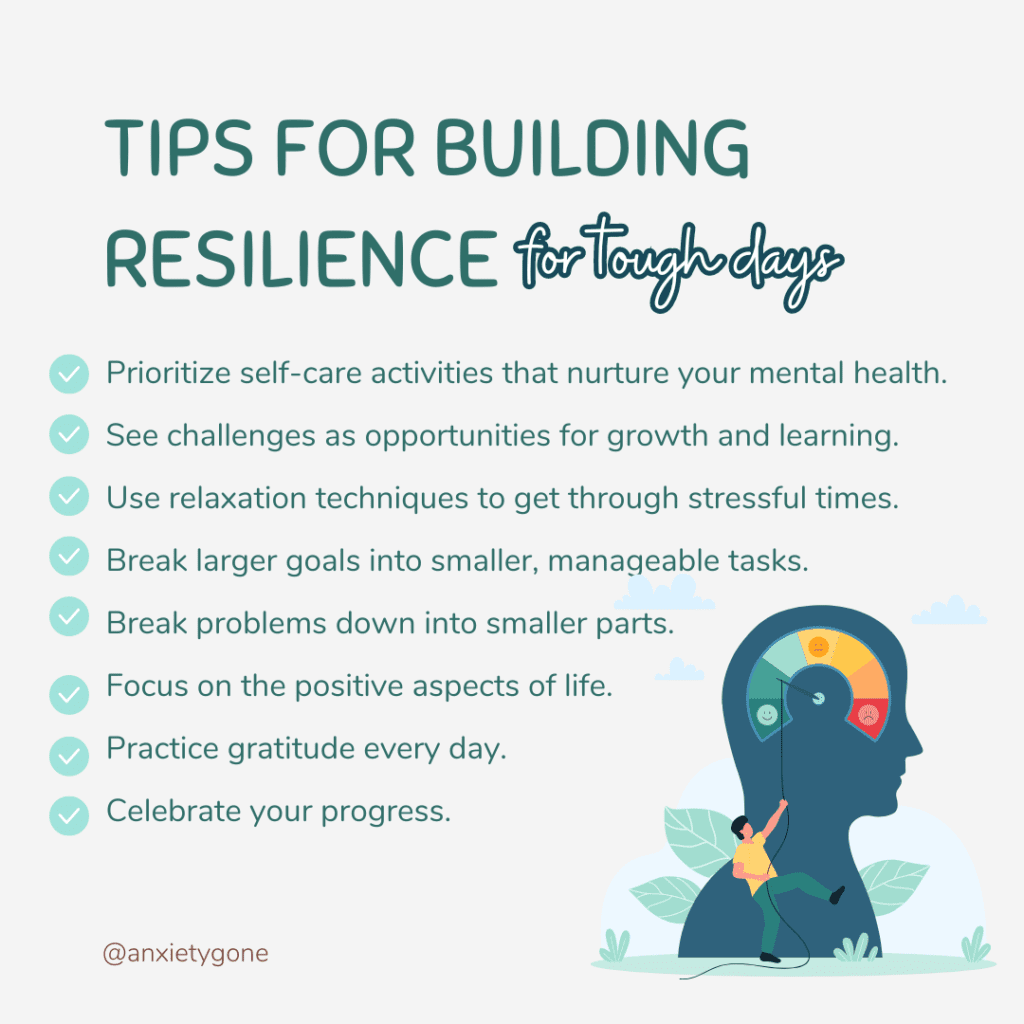Full Disclosure: Clicking on these links could mean a tiny commission for me, at no extra cost to you.
Throughout our lives, we encounter all kinds of challenges that stir up a whirlwind of emotions. Whether it’s work stress or family pressures, we’re often inundated with hurdles that put our mental health to the test. Life will have inevitable stressors. As such, it’s essential to find ways to copes and developing resilience is a key component. Whether it’s practicing mindfulness, using meditation eyes open, setting achievable goals, or seeking support, building resilience can greatly enhance our mental well-being and help us navigate life’s ups and downs more effectively.
What is Resilience?
Resilience refers to the ability to bounce back from setbacks or challenges like job loss, illness, or loss of a loved one. It’s not about avoiding stress or hardship but rather, confronting them with confidence knowing you can handle them effectively.
Unfortunately, most of us lack resilience in life and have a hard time accepting the hardships that come with life. And when you cannot cope with the inevitable stress life sends your way, you are at risk of falling into a deeper mental state.
The good news: developing resilience will help you when dealing with stress and other mental health concerns. It allows you to better cope with life’s ups and downs and protect your mental health.
Techniques For Developing Resilience
In the face of uncertainty and adversity, resilience has become an indispensable skill for navigating life’s challenges. Fortunately, resilience can be developed and strengthened over time with resilience practices and techniques that help you:
- Overcome obstacles and challenges.
- Enable effective stress management, reducing the impact of stressors on mental well-being.
- Foster a positive outlook, even in the face of adversity.
- Promote psychological and emotional strength, aiding in the recovery from setbacks.
- Enhance problem-solving skills, making it easier to navigate difficult situations more effectively.
- Encourage adaptability and flexibility in response to changing circumstances.
- Support healthy coping mechanisms, reducing the risk of maladaptive behaviors.
- Strengthen interpersonal relationships by fostering empathy and understanding.
- Facilitate personal growth and development through learning from experiences.
- Contribute to overall mental and emotional well-being, leading to a more fulfilling and resilient life.
If you’re seeking to enhance your resilience and lead a more fulfilling life, you’ve come to the right place. Let’s take a look at some techniques for developing resilience.
Exclusive Offer: Enjoy a FREE Month of Online Breathwork Classes
Practicing A Growth Mindset
Life is full of ups and downs, and it’s how you approach challenges that really matters. Instead of seeing obstacles as roadblocks, let’s view them as chances to grow and learn.
When setbacks happen, let’s not beat ourselves up about it. Instead, let’s treat them as stepping stones toward building new skills and strengths. It’s all about turning setbacks into setups for success!
Practicing a growth mindset involves adopting certain habits and attitudes that promote learning, resilience, and personal development. Here are some ways to cultivate a growth mindset:
- Embrace Challenges: Instead of avoiding challenges, actively seek them out as opportunities for growth and learning. Approach them with curiosity and a willingness to learn from both successes and failures.
- View Effort as Path to Mastery: Understand that mastery and success come through effort, practice, and perseverance. Value the process of learning and improvement, rather than focusing solely on outcomes.
- Learn from Feedback: Welcome feedback, whether it’s positive or constructive criticism, as valuable information that can help you grow and improve. Use feedback as a guide for self-reflection and continuous development.
- Replace “I Can’t” with “I Can’t Yet”: Shift your mindset from fixed limitations to potential growth by adding the word “yet” to statements like “I can’t do this.” Recognize that skills and abilities can be developed over time with effort and practice.
- Cultivate Curiosity: Stay curious and open-minded, constantly seeking out new experiences, knowledge, and perspectives. Approach challenges with a sense of wonder and exploration.
- Focus on Learning Goals: Instead of solely focusing on performance goals, prioritize learning and skill development. Set specific, achievable learning goals that challenge you to stretch beyond your current abilities.
- Persist in the Face of Setbacks: When faced with setbacks or failures, maintain a positive attitude and resilience. View setbacks as opportunities for learning and growth, and persevere in the face of challenges.
- Surround Yourself with Growth-Minded People: Surround yourself with individuals who have a growth mindset and support your efforts to learn and develop. Engage in discussions and activities that promote growth and encourage one another’s progress.
- Celebrate Progress: Acknowledge and celebrate your progress and achievements along the way, no matter how small. Recognize that growth is a journey, and every step forward is a success worth celebrating.
- Practice Self-Compassion: Be kind to yourself during times of struggle or failure. Treat yourself with the same compassion and understanding that you would offer to a friend, and use setbacks as opportunities for self-reflection and growth.
Practice Self-Care
It’s easy to overlook the importance of self-care, especially when your daily schedule is filled with other things. But remember, taking care of yourself is crucial, especially when facing challenging situations. You are your own best advocate and protector.
Here are some ways to practice self-care:
- Prioritize Sleep: Aim for 7-9 hours of quality sleep each night to rejuvenate your body and mind.
- Regular Exercise: Engage in physical activities you enjoy, whether it’s yoga, jogging, dancing, or hiking, to boost mood and reduce stress.
- Healthy Eating: Nourish your body with a balanced diet rich in fruits, vegetables, whole grains, and lean proteins to support overall well-being.
- Mindfulness and Meditation: Take time for mindfulness practices or meditation to calm your mind, reduce anxiety, and increase self-awareness.
- Set Boundaries: Learn to say no to commitments or activities that drain your energy or overwhelm you, and prioritize activities that replenish you.
- Creative Expression: Engage in creative hobbies or activities, such as painting, writing, or playing music, to express yourself and unwind.
- Social Connection: Spend time with supportive friends and family members, or join social groups or clubs to foster meaningful connections.
- Unplug: Take breaks from screens and technology to reduce stress and improve mental clarity.
- Self-Compassion: Practice self-compassion and self-kindness, treating yourself with the same understanding and empathy you would offer a friend.
- Relaxation Techniques: Incorporate relaxation techniques like deep breathing exercises, progressive muscle relaxation, or indulging in a warm bath to unwind and de-stress.
Remember that self-care looks different for everyone, so it’s essential to find what works best for you and prioritize it regularly.
Prioritizing self-care isn’t selfish; it’s a vital part of building self-confidence and resilience. This means making time for things like restful sleep, regular exercise, nourishing meals, and activities that rejuvenate your spirit and bring you joy. You deserve to prioritize your well-being, so don’t forget to invest in yourself!
Exclusive Offer: Get Access to the #1 Mindfulness App Here
Develop Healthy Coping Skills
Build Strong Support Networks
Surrounding yourself with supportive friends, family members, and colleagues can be a better choice to maintain your mental health. They can offer encouragement, advice, and perspective during tough times.
Your support network serves as a vital resource for building resilience. By leaning on them, you can navigate difficulties with greater ease and find strength in knowing you’re not alone.
Set Realistic Goals
Breaking down big goals into smaller, achievable tasks is key to success. While it’s great to dream big, setting unrealistic goals can lead to disappointment and frustration.
Instead, focus on setting realistic goals that you can work towards incrementally. By celebrating your progress along the way, you’ll build confidence and a sense of accomplishment. This approach strengthens your resilience and sets you up for success in the long run.
Practice A Positive Outlook
Positivity is a powerful force in life. It fuels resilience and helps you navigate the ups and downs with grace.
To cultivate optimism and gratitude, focus on the things you’re thankful for and seek out silver linings in challenging situations. By adopting a positive outlook, you’ll find yourself better equipped to handle whatever life throws your way, drawing upon your skills and expertise with confidence.
Incorporating Resilience Into Daily Life
Developing resilience is an ongoing journey that demands dedication and practice. By weaving resilience-building techniques into your daily routines, you can fortify your mental health and overall well-being over time.
Consider the strategies mentioned above. They offer valuable tools for navigating life’s trials. Take a moment to reflect: Have you ever found yourself searching for solutions during tough times?
If not, these techniques can be your guiding light, offering pathways to problem-solving and inner peace. Through prioritizing self-care, nurturing a growth mindset, setting achievable goals, and fostering a positive perspective, you’ll bolster your resilience and thrive amidst life’s adversities.

The Power Of Resilience
Developing resilience serves as a powerful tool for maintaining good mental health and navigating life’s challenges with grace and strength. By incorporating resilience-building techniques into your daily life, you can adapt to change and better navigate the challenges of our rapidly changing world. Keep in mind that developing resilience is a continuous journey, not a final destination. Every small step you take each day contributes to significant enhancements in your mental health and overall well-being.
Full Disclosure: Clicking on these links could mean a tiny commission for me, at no extra cost to you.










